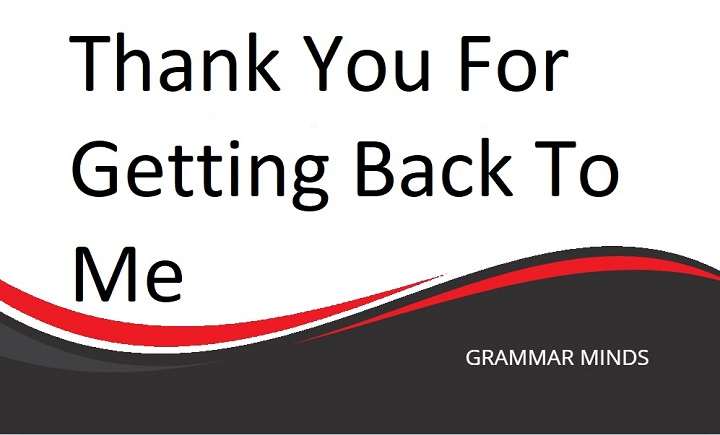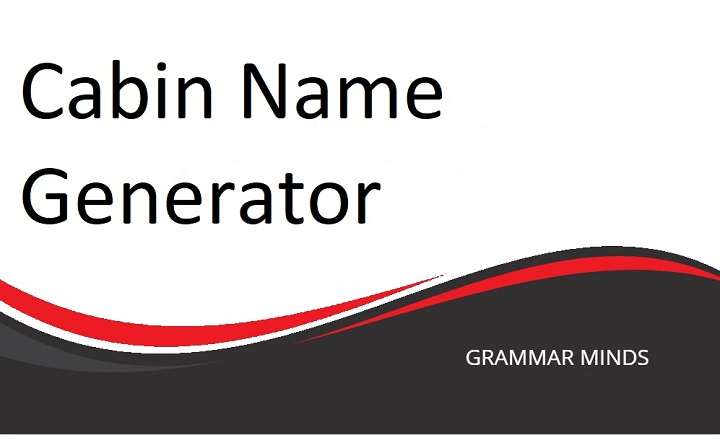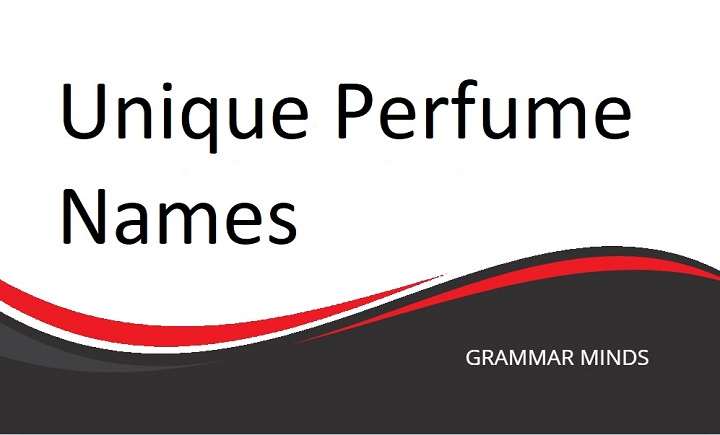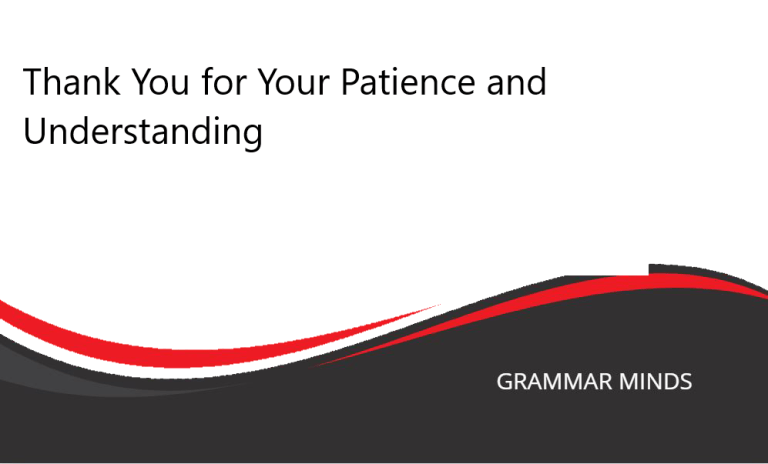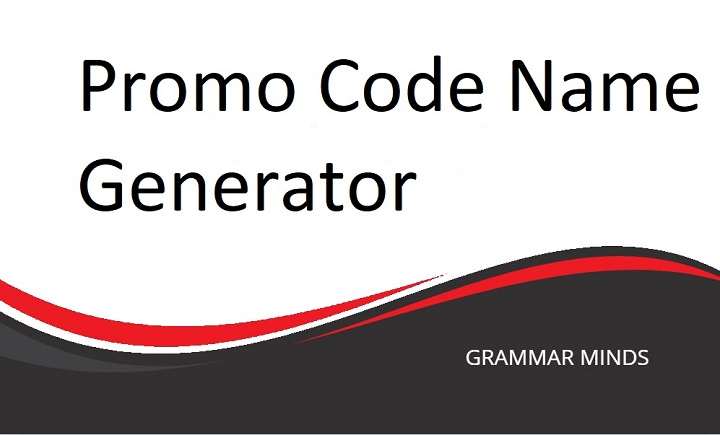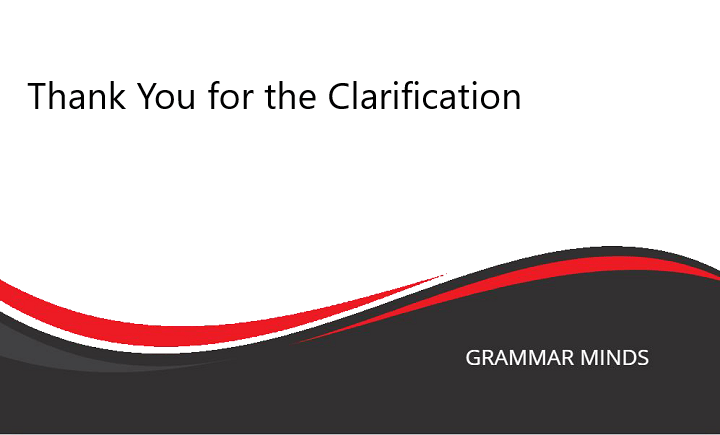The phrase “Thank you for getting back to me” is a common expression used in professional and personal communication, particularly in emails, phone calls, or text messages. It conveys gratitude when someone responds to your query or request, especially after a delay. But do you find yourself using this phrase repeatedly? While it’s polite and grammatically correct, there may come a point where it feels overused and lacks variety in your conversations.
If you’re looking for ways to freshen up your language without losing the intended message, you’re in the right place. This article provides a handy list of alternative phrases that you can use to replace the familiar “Thank you for getting back to me” and improve the diversity of your language, whether you’re communicating in a formal business setting or casually with friends.
Other Ways to Say “Thank You for Getting Back to Me”
Using the same phrase over and over can make your communication seem routine, but by incorporating new expressions, you can bring variety and warmth to your interactions. Here are ten alternatives that will help you sound more varied and sophisticated:
I Appreciate Your Prompt Response
This phrase is ideal for professional settings. It communicates gratitude but also emphasizes the timeliness of the response, making it a great alternative when you want to acknowledge quick replies.
Thank You for Your Time and Response
This is a formal way to express thanks, particularly when dealing with clients, superiors, or business contacts. It shows that you value both the person’s time and their effort in getting back to you.
I’m Grateful for Your Quick Response
Slightly more personal than “I appreciate your prompt response,” this expression conveys genuine gratitude and can be used in both formal and informal communications.
Thanks for Getting Back to Me So Quickly
A more casual version of the formal alternatives, this phrase works well in personal conversations or informal emails, especially when you’re close to the recipient.
I Truly Appreciate You Following Up
Perfect for instances where someone follows up after a long delay or difficult process. It’s a formal way of showing that you value their diligence in the conversation.
I Appreciate You Circling Back with Me
This phrase is suitable for professional settings where ongoing discussions or negotiations are taking place. It shows you’re thankful for the recipient returning to the topic after a gap in communication.
Thank You for Responding So Fast
A less formal yet polite alternative, this phrase works well in professional settings but maintains a friendlier tone compared to more formal expressions.
I Value Your Prompt Feedback
When you’re looking for something that acknowledges both the response and any input the person has provided, this phrase fits perfectly, especially when feedback is crucial in decision-making.
Thank You for Reaching Out Again
This is a softer, polite phrase for when someone has re-initiated communication after some time has passed, or when you were awaiting their follow-up.
I’m Glad We Could Continue This Conversation
If you’re resuming a discussion or revisiting a previous topic, this phrase expresses that you’re happy the conversation is moving forward. It’s great for both formal and informal contexts.
Key Notes
While “Thank you for getting back to me” is grammatically correct and suitable for both formal and informal situations, it can sometimes feel a bit basic or overused. Here’s how to switch things up with some of the alternatives:
- “I Appreciate Your Prompt Response” is excellent for formal emails or meetings. It adds a touch of professionalism and is great for acknowledging the speed of a reply.
- “Thank You for Your Time and Response” works well in more formal situations, particularly when dealing with senior professionals or clients.
- “Thanks for Getting Back to Me So Quickly” is an informal and friendly option you can use in personal conversations or casual professional emails.
Below, we’ll explore how to use each phrase in various scenarios and provide real-life examples to help you understand how these alternatives fit into both formal and informal conversations.
I Appreciate Your Prompt Response
Usage:
If you’re looking for a more formal and polished way to express thanks, “I appreciate your prompt response” is a perfect fit. It conveys gratitude while also recognizing that the recipient responded quickly. This makes it ideal for professional emails or business communications.
Example (in an email):
Dear Mr. Anderson,
Thank you for your insight regarding our recent project discussion. I appreciate your efforts and look forward to collaborating further.
I appreciate your prompt response.
Best regards,
Jane Doe
Thank You for Your Time and Response
Usage:
This phrase is formal and polite, acknowledging that the person has taken the time to respond. It is best suited for formal settings, especially when communicating with higher-ups, clients, or in formal business exchanges.
Example (in an email):
Dear Dr. White,
Thank you for your valuable input during today’s meeting. I understand that your schedule is tight, and I truly appreciate your time and response.
Kind regards,
Michael Smith
I’m Grateful for Your Quick Response
Usage:
A more heartfelt and personal version of “I appreciate your prompt response,” this phrase works in both formal and informal communications. It allows you to express genuine gratitude, whether you’re speaking with a colleague or a friend.
Example (in an email):
Hi Sarah,
Thank you for sending over the report so quickly. I’m grateful for your quick response and your hard work.
Best,
Tom
Thanks for Getting Back to Me So Quickly
Usage:
This is a casual alternative that works well in personal communications, such as with friends or close colleagues. It maintains politeness but is friendlier in tone than the more formal options.
Example (in conversation):
Hey John,
Thanks for getting back to me so quickly about the project update. I appreciate it!
Talk soon,
Emily
I Truly Appreciate You Following Up
Usage:
This phrase is best suited for formal settings, particularly when someone has gone out of their way to follow up on a matter. It works well in emails or conversations with clients or business partners, especially in cases where there’s been a delay in response.
Example (in an email):
Dear Mr. Brown,
Thank you for taking the time to follow up with me regarding the contract review. I truly appreciate you following up.
Best regards,
Olivia Adams
Is It Correct to Say “Thank You for Getting Back to Me”?
Yes! “Thank you for getting back to me” is a grammatically correct phrase that can be used in both formal and informal settings. It’s a versatile expression that fits into professional emails, casual chats, and conversations with friends or colleagues.
However, as with any commonly used phrase, it can sometimes feel repetitive. Using the alternatives provided in this article will help you freshen up your language and bring more variety to your conversations.
You can also try slight variations, like:
- “Thanks for reaching out to me.”
- “I appreciate you getting back to me.”
- “Thank you for responding.”
These subtle changes can keep your communication dynamic without straying too far from the original meaning.
Also Read
10 Alternative Ways to Say “Thank You for Your Patience and Understanding”
In conclusion, “Thank you for getting back to me” is a perfectly acceptable and grammatically correct phrase, suitable for both formal and informal contexts. However, by using the alternative phrases provided in this article, you can diversify your communication, make your conversations more engaging, and tailor your responses based on the situation.
Whether you’re thanking a colleague for a quick email response or acknowledging a friend who reached out after a long time, mixing up your language with these alternatives will ensure you sound thoughtful, professional, and attentive.

